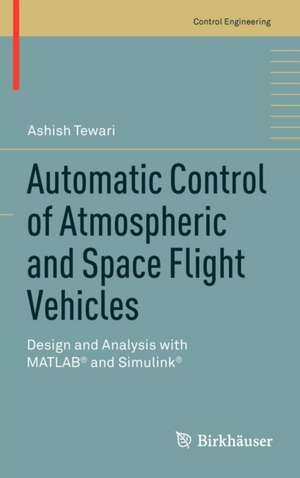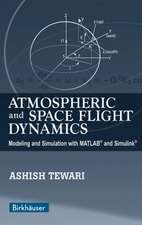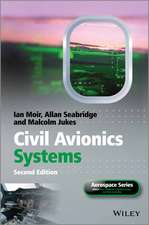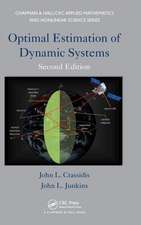Automatic Control of Atmospheric and Space Flight Vehicles: Design and Analysis with MATLAB® and Simulink®: Control Engineering
Autor Ashish Tewarien Limba Engleză Hardback – 4 aug 2011
In addition to the basics of flight control, this book covers a number of upper-level topics and will therefore be of interest not only to advanced students, but also to researchers and practitioners in aeronautical engineering, applied mathematics, and systems/control theory.
Din seria Control Engineering
- 18%
 Preț: 769.02 lei
Preț: 769.02 lei - 18%
 Preț: 822.82 lei
Preț: 822.82 lei - 18%
 Preț: 891.06 lei
Preț: 891.06 lei - 20%
 Preț: 800.64 lei
Preț: 800.64 lei - 18%
 Preț: 978.69 lei
Preț: 978.69 lei - 15%
 Preț: 702.54 lei
Preț: 702.54 lei - 18%
 Preț: 947.85 lei
Preț: 947.85 lei - 18%
 Preț: 730.02 lei
Preț: 730.02 lei - 18%
 Preț: 945.30 lei
Preț: 945.30 lei - 15%
 Preț: 648.24 lei
Preț: 648.24 lei - 15%
 Preț: 652.64 lei
Preț: 652.64 lei - 15%
 Preț: 641.35 lei
Preț: 641.35 lei - 15%
 Preț: 650.86 lei
Preț: 650.86 lei - 15%
 Preț: 652.49 lei
Preț: 652.49 lei - 15%
 Preț: 647.27 lei
Preț: 647.27 lei - 15%
 Preț: 538.76 lei
Preț: 538.76 lei -
 Preț: 380.84 lei
Preț: 380.84 lei - 18%
 Preț: 1113.89 lei
Preț: 1113.89 lei - 18%
 Preț: 1683.66 lei
Preț: 1683.66 lei -
 Preț: 400.65 lei
Preț: 400.65 lei - 15%
 Preț: 650.86 lei
Preț: 650.86 lei - 18%
 Preț: 952.72 lei
Preț: 952.72 lei - 15%
 Preț: 704.87 lei
Preț: 704.87 lei - 18%
 Preț: 950.96 lei
Preț: 950.96 lei - 18%
 Preț: 1025.16 lei
Preț: 1025.16 lei - 15%
 Preț: 646.11 lei
Preț: 646.11 lei - 18%
 Preț: 960.78 lei
Preț: 960.78 lei - 15%
 Preț: 580.17 lei
Preț: 580.17 lei - 15%
 Preț: 643.34 lei
Preț: 643.34 lei -
 Preț: 394.12 lei
Preț: 394.12 lei - 20%
 Preț: 654.55 lei
Preț: 654.55 lei - 19%
 Preț: 569.56 lei
Preț: 569.56 lei - 18%
 Preț: 952.40 lei
Preț: 952.40 lei
Preț: 707.78 lei
Preț vechi: 832.68 lei
-15% Nou
Puncte Express: 1062
Preț estimativ în valută:
135.48€ • 147.21$ • 113.87£
135.48€ • 147.21$ • 113.87£
Carte tipărită la comandă
Livrare economică 22 aprilie-06 mai
Preluare comenzi: 021 569.72.76
Specificații
ISBN-13: 9780817648633
ISBN-10: 0817648631
Pagini: 374
Ilustrații: XIV, 374 p. 163 illus.
Dimensiuni: 155 x 235 x 22 mm
Greutate: 0.72 kg
Ediția:2011
Editura: Birkhäuser Boston
Colecția Birkhäuser
Seria Control Engineering
Locul publicării:Boston, MA, United States
ISBN-10: 0817648631
Pagini: 374
Ilustrații: XIV, 374 p. 163 illus.
Dimensiuni: 155 x 235 x 22 mm
Greutate: 0.72 kg
Ediția:2011
Editura: Birkhäuser Boston
Colecția Birkhäuser
Seria Control Engineering
Locul publicării:Boston, MA, United States
Public țintă
Upper undergraduateCuprins
Preface.- 1 Introduction.- 2 Flight Dynamic Models.- 3 Control Design Techniques.- 4 Automatic Control of Aircraft.- 5 Automatic Control of Rockets.- 6 Automatic Control of Spacecraft.- Appendix A Linear Optimal Control.- References.
Recenzii
From the reviews:
“Book describes the topics on introductory material on controls, Flight Dynamic Models, Control Design Techniques, Automatic Control of Aircraft, Rockets, and Spacecraft. … The book, with good collection of exercises with answers, makes it an excellent choice for using it to teach relevant courses for undergraduate senior or graduate junior year students in Aerospace, Mechanical, Electrical Engineering. Others working in aerospace-related industry, federal labs will find it useful for self-study. … It is a good addition to the related field of aerospace controls … .” (D. Subbaram Naidu, Amazon.com, June, 2013)
“Book describes the topics on introductory material on controls, Flight Dynamic Models, Control Design Techniques, Automatic Control of Aircraft, Rockets, and Spacecraft. … The book, with good collection of exercises with answers, makes it an excellent choice for using it to teach relevant courses for undergraduate senior or graduate junior year students in Aerospace, Mechanical, Electrical Engineering. Others working in aerospace-related industry, federal labs will find it useful for self-study. … It is a good addition to the related field of aerospace controls … .” (D. Subbaram Naidu, Amazon.com, June, 2013)
Textul de pe ultima copertă
Perhaps the only full publication to present a unified and straightforward introduction to the design and analysis of automatic control systems for both atmospheric and space flight vehicles, Automatic Control of Atmospheric and Space Flight Vehicles is intended to be a textbook for senior undergraduate and graduate students in aerospace engineering/aeronautics and astronautics departments. Covering basic control theory and design concepts, the material in the book has been specifically developed for a modern course on flight control systems, where the artificial distinction between aircraft, rockets, and spacecraft is removed. A wide variety of flight control topics are presented in a concise and easy-to-read—yet rigorous—manner.
The book highlights an understanding of relevant flight dynamic principles required for designing a flight control system, placing specific emphasis on a wealth of realistic examples and exercises that require programming. A particularly appealing feature of the text is the ready and extensive use of MATLAB®/Simulink® codes in the many solved examples illustrating flight control design and analysis; these examples give the reader hands-on experience with practical problems and make the book an even more useful and illuminating tool. For convenience, all the codes used can be downloaded from the author's and publisher’s websites. Moreover, selected exercise solutions are provided in the text, and a full solutions manual is available to instructors online.
The coverage of flight control topics in the book is fundamental rather than exhaustive, with a greater emphasis on single-variable control for a strong understanding of the relevant concepts. The work may therefore be used for a first course on flight control systems. However, it also covers some advanced topics—such as linear optimal control, nonlinear orbit plane control, and two-point boundaryvalue problem solution for de-orbiting spacecraft—imparting a flavor of the variety found in automatic flight control, and will be of interest to experienced researchers and practitioners in aerospace and control engineering.
The book highlights an understanding of relevant flight dynamic principles required for designing a flight control system, placing specific emphasis on a wealth of realistic examples and exercises that require programming. A particularly appealing feature of the text is the ready and extensive use of MATLAB®/Simulink® codes in the many solved examples illustrating flight control design and analysis; these examples give the reader hands-on experience with practical problems and make the book an even more useful and illuminating tool. For convenience, all the codes used can be downloaded from the author's and publisher’s websites. Moreover, selected exercise solutions are provided in the text, and a full solutions manual is available to instructors online.
The coverage of flight control topics in the book is fundamental rather than exhaustive, with a greater emphasis on single-variable control for a strong understanding of the relevant concepts. The work may therefore be used for a first course on flight control systems. However, it also covers some advanced topics—such as linear optimal control, nonlinear orbit plane control, and two-point boundaryvalue problem solution for de-orbiting spacecraft—imparting a flavor of the variety found in automatic flight control, and will be of interest to experienced researchers and practitioners in aerospace and control engineering.
Caracteristici
The first book with a unified approach to both atmospheric and space flight control systems Written in a concise and easy-to-read manner, but without sacrificing mathematical rigor For a broad audience of advanced undergraduates, graduate students, researchers, and practitioners in engineering and applied mathematics Many practical examples, figures, and problems emphasize the underlying physical principles of many concepts End-of-chapter exercises and highly practical hands-on programming tools in MATLAB®/Simulink®, with selected solutions in print and online (www.home.iitk.ac.in/~ashtew) Includes supplementary material: sn.pub/extras









